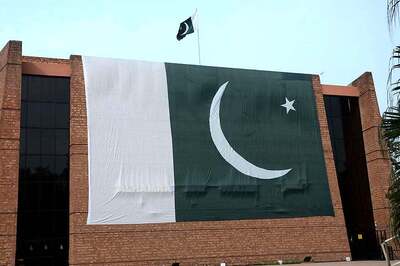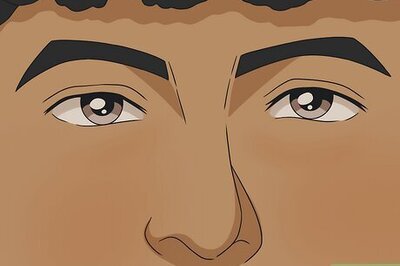
views
Abuja: A powerful blast hit a Catholic church on the outskirts of the Nigerian capital Abuja during a Christmas service on Sunday killing many people, residents said, and one counted 19 bodies from the explosion.
Emergency services said 10 bodies had been recovered from the scene so far, and earlier said there were not enough ambulances available to evacuate all the dead and the wounded.
Witnesses said St Theresa's Church in Madala, an Abuja satellite town about 40 km from the city centre, was packed out and that there were many dead from the blast, which also blew out windows of neighboring houses.
"In these three vehicles, there are 15 bodies," a Federal Road Safety official in a reflective jacket told Reuters on the scene outside a police cordon, gesturing at three ambulances.
Hours later, another blast went off at the Mountain of Fire and Miracles Church in the central, ethnically and religiously mixed town of Jos, witnesses and police said.
A Reuters cameraman on the scene said he saw one lightly wounded policeman from that explosion, but there were no reports of other casualties.
"I heard the blast. My house shook," resident Tony Akpan said of the Madala Catholic church bomb.
"I came out to the front of the church to see what was happening. I counted 19 bodies myself, many of them mutilated, and five destroyed vehicles."
Another witness, Timothy Onyekwere, said: "We were in the church with my family when we heard the explosion. I just ran out. Now I don't even know where my children or my wife are. I don't know how many were killed but there were many dead."
Some said the blast was inside and others thought it came from just outside the church.
National Emergency Management Agency (NEMA) spokesman Yushau Shuaibu, who had earlier confirmed there had been a bombing at a church, later put out a statement saying the blast had been on the highway nearby, not at the church itself.
It was not known who exploded the bomb but Nigerian security forces are battling the militant Islamist Boko Haram group, which wants to impose Islamic sharia law across the country split roughly equally between Christians and Muslims.
"We are presently there, evacuating the dead and the injured, but unfortunately we don't have enough ambulances, the NEMA spokesman said by telephone. "Most of our ambulances have gone to operate on the major highways of the country," he added.
A Reuters reporter at the scene said the whole area around the church was cordoned off by police. The reporter saw thousands of angry youths set up burning road blocks on the main highway from Abuja leading to Nigeria's largely Muslim north.
Police and the military tried to disperse them by firing live rounds into the air along with tear gas amid chaotic scenes.
BOKO HARAM LINK?
There was no claim of responsibility, but Islamist sect Boko Haram has been blamed for dozens of bombings and shootings in the north, and has claimed responsibility for two bombings in Abuja this year, including Nigeria's first suicide bombing on the U.N. headquarters in August that killed at least 23 people.
Last Christmas Eve, a series of bomb blasts around Jos killed 32 people, and others people died in attacks on two churches in the northeast of Africa's most populous nation.
Gun battles between the security forces and Boko Haram killed at least 68 people in two days of fighting in northern Nigeria, authorities and hospital sources said on Saturday.
Boko Haram has been blamed for scores of shootings and bombings in Nigeria's remote, semi-arid northeast, including a spate of attacks in the past few weeks.
Boko Haram - which in the Hausa language spoken in northern Nigeria means "Western education is sinful" - is loosely modeled on the Taliban movement in Afghanistan.
Rights groups say more than 250 people have been killed by Boko Haram since July 2010.
On August 26, a suicide bomber struck the U.N. building in Abuja. At least 23 people were killed and 76 wounded by the bombing which gutted the ground floor and smashed almost all the windows. Boko Haram claimed responsibility on August 29, demanding the release of prisoners and an end to a security crackdown aimed at preventing more bombings.
The blast was the first known suicide bombing in Nigeria. It marked an escalation in the group's tactics and revealed an increase in the sophistication of explosives it uses.




















Comments
0 comment